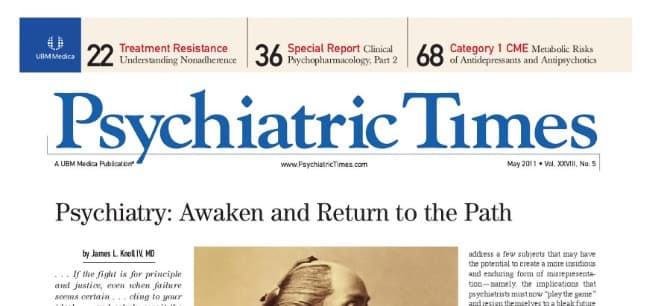Rebuttal to a commentary in September 11, 2023 Psychiatric Times
A commentary in the September 11, 2023 issue of Psychiatric Times by Mark L. Ruffalo, MSW, DPsa and S. Nassir Ghaemi, MD, MPH claims that adult ADHD is not a medically-valid and -validated disease based on “accepted diagnostic validators (course, genetics, biological markers, symptoms)”. Unless otherwise stated, all quotes are from Ruffalo and Ghaemis’ commentary.
In the case of a novel psychiatric disorder, it is either true that (1) psychopathologists and psychiatric nosologists have missed the disorder for more than a century, or (2) that the disorder is a case of disease mongering, when a condition that has never been observed is suddenly made popular overnight as a result of social, cultural, and economic reasons. We argue that the latter is true for adult ADHD.
Any statement regarding medicine from a century ago might as well be looking at the state of medicine during the Dark Ages when leeching was a front-line treatment for almost every sickness and disorder. Many of today’s clinically-valid diagnoses did not exist around time of the Great Depression.
Ruffalo and Ghaemis state the medical model better addresses the condition named adult ADHD. Why aren’t all medical personnel looking at thyroid, hormone, nutrition, inflammatory, genetic history, family history, and genogramic information prior to any adult ADHD diagnosis? Why has the medical profession allowed managed health care to mandate 20-minute diagnostic appointments? How much can anyone really do in ten minutes? Who is standing up for patients’ rights and wellbeing?
As a simpleton adult ADHD coach, I take this pertinent information into consideration as I work with my clients in weekly hour-long sessions.
Counselors and therapists often spend an hour a week with our clients and patients. Assuming the proposed medical model of triage is superior to the current situation, why are doctors, counselors, and therapists not schooled to better support these methods where the biologic and neurologic issues are first examined? Assuming the suggested model is the better pathway, why do we experience such a systemic failure in the medical system? It can be inferred from Ruffalo and Ghaemis statements that this should have been the standard of care for the last century.
Half a century ago, life was slower and less structured. Demands for time were not driven by cell phones and digital assistants. Nor was the world exposed to the constant social comparisons delivered directly to us at all hours of the day by social media. Fifty years ago, the equivalent of social media was TV that didn’t have a rewind button and was not available everywhere we went, 24/7. A century ago, rural areas still relied on horses for working the farm and producing food. I wish to understand how comparisons to these times are relevant to this debate.
Perhaps the reason why adult ADHD was rarely if ever seen in adulthood half a century ago is the same reason that pre-Colombian syphilis in Europe and pre-Clovis populations in America “did not exist”: no one was looking for either of them due to dogmatic cultures and stigma.
I recall a conversation with my mom thirty years ago when she commented on the increased use of antidepressants across the country. My reference to this conversation has as much scientific and philosophical validity to the debate as their inclusion of the state of medicine from a century ago.
One of the greatest problems with adult ADHD is the propensity of providers to mis-diagnose the issue as anxiety, depression, or “more classic and scientifically validated psychiatric conditions”.
Plenty of other psychiatric disorders exist that can cause ADHD-like symptoms, and in current practice, individuals with these symptoms receive misdiagnoses of adult ADHD.
What do the people who suffer from ADHD-like symptoms do when “more classic and scientifically validated” treatments don’t work? Who do they turn to when psychiatrists continue to prescribe antidepressants and antianxiety medications year after year with little appreciable improvement? How is this course of treatment ethically- and scientifically-valid? I base my comments from my work with people who self-identify with adult ADHD symptoms. Perhaps the participant population in my anecdotal research is too narrow, since all of them self-identify as having adult ADHD and only self-report frustration, history, and results.
I perceive adult ADHD to be a syndrome that includes ongoing problems with inattention, restlessness, disorganization, planning, task completion, euphoric mood, racing thoughts, irritability, increased activity, impulsive behavior, impaired functioning, insomnia, and long hours at work with little accomplishment (Adler, 2004), executive functioning struggles (Boonstra), and other age-inappropriate behaviors combined with an ability to inhibit motor, verbal, cognitive, and emotional activities (Barkley), with singular or comoribd issues expressing both executive functioning and regulatory functions (e.g., processing speed) (Nigg). Each and every one of these problems should be singularly diagnosed when the presenting problem is the sole presenting problem. When one looks at the big picture of how many of these symptoms comorbidly present in individual persons, I believe a syndrome is a more realistic view of adult ADHD.
Ruffalo and Ghaemis state the
rise in diagnosis of adult ADHD fully coincides with marketing by the pharmaceutical industry when Eli Lilly and Company got the first US Food and Drug Administration indication for this label with atomoxetine (Strattera) in 1996. Since that date, many academics have been promoting the concept of adult ADHD. The adult ADHD market has become a multibillion-dollar industry, with the rise of digital companies specializing in online diagnosis and treatment—some of which have come under legal scrutiny.
I have two concerns with this statement: (1) I could say the same thing about SSRI medications prescribed for anxiety. Big pharma has been raking in profits from Prozac/fluoxetine since 1986. (2) The statement concerning bogus diagnoses also applies to the opioid problem. If I could shut down these prescription mills, I would do so. I really want to know how either of these statements by Ruffalo and Ghaemis support the scientific validity of adult ADHD being nothing more than the “diagnosis du jour”? ADHD medications at any age as the sole treatment plan is not the answer.
Before we make a case that adult ADHD is a sham diagnosis, I want to see more data and references to recent peer-reviewed research from both sides of the debate. I want to see the results of peer-reviewed fMRI studies. Ruffalo and Ghaemis have crafted an a priori argument. Show me the beef.
The commentary leads with “rapid shifts in conceptualization... almost always warrant informed critical examination”. Their commentary is not that.
I’m not a doctor. I don’t have a lot of fancy letters behind my name. I work with the adult ADHD population. It’s time for a real diagnostic protocol and treatment for the syndrome currently misnamed “adult ADHD”, not just another diatribe of what it is not.
Sources
Adler, L.A. (2004) Clinical Presentations of Adult Patients With ADHD. J Clin Psychiatry 2004;65 suppl 3]:8–11
Adler, LA, Faraone, SV, Spencer, TJ, Berglund, P, Alperin, S, Kessler, RC. (2017) The structure of adult ADHD. Int J Methods Psychiatr Res. 2017; 26:e1555. https://doi.org/10.1002/mpr.1555
Asherson, P., Akehurst, R., Kooij, J. J. S., Huss, M., Beusterien, K., Sasané, R., Gholizadeh, S., & Hodgkins, P. (2012). Under Diagnosis of Adult ADHD: Cultural Influences and Societal Burden. Journal of Attention Disorders, 16(5_suppl), 20S-38S. https://doi.org/10.1177/1087054711435360
Barkley, R.A. (2010). Differential Diagnosis of Adults With ADHD: The Role of Executive Function and Self-Regulation. Journal of Clinincal Psychiatry, July 15, 2010
Boonstra, M.A., Oosterlaan, J., Sergeant, J., & Buitelaar, J. (2005). Executive functioning in adult ADHD: A meta-analytic review. Psychological Medicine, 35(8), 1097-1108. doi:10.1017/S003329170500499X
Faraone, S. V., & Biederman, J. (2005). What Is the Prevalence of Adult ADHD? Results of a Population Screen of 966 Adults. Journal of Attention Disorders, 9(2), 384-391. doi.org/10.1177/1087054705281478
Gil Zalsman & Tal Shilton (2016) Adult ADHD: A new disease?, International Journal of Psychiatry in Clinical Practice, 20:2, 70-76, DOI: 10.3109/13651501.2016.1149197
Kooij, J.J.S. (2013) Adult ADHD, DOT 10.1007/978-1-4471-4138-9_1, O Springer-Verlag London
Lenard A. Adler, Thomas Spencer, Stephen V. Faraone, Ronald C. Kessler, Mary J. Howes, Joseph Biederman & Kristina Secnik (2006) Validity of Pilot Adult ADHD Self- Report Scale (ASRS) to Rate Adult ADHD Symptoms, Annals of Clinical Psychiatry, 18:3, 145-148, DOI: 10.3109/10401230600801077
Nigg, J. T., Stavro, G., Ettenhofer, M., Hambrick, D. Z., Miller, T., & Henderson, J. M. (2005). Executive functions and adhd in adults: Evidence for selective effects on ADHD symptom domains. Journal of Abnormal Psychology, 114(4), 706–717. doi.org/10.1037/0021-843X.114.3.706
Wolf, L.E. and Wasserstein, J. (2001), Adults ADHD. Annals of the New York Academy of Sciences, 931: 396-408. doi.org/10.1111/j.1749-6632.2001.tb05793.x







